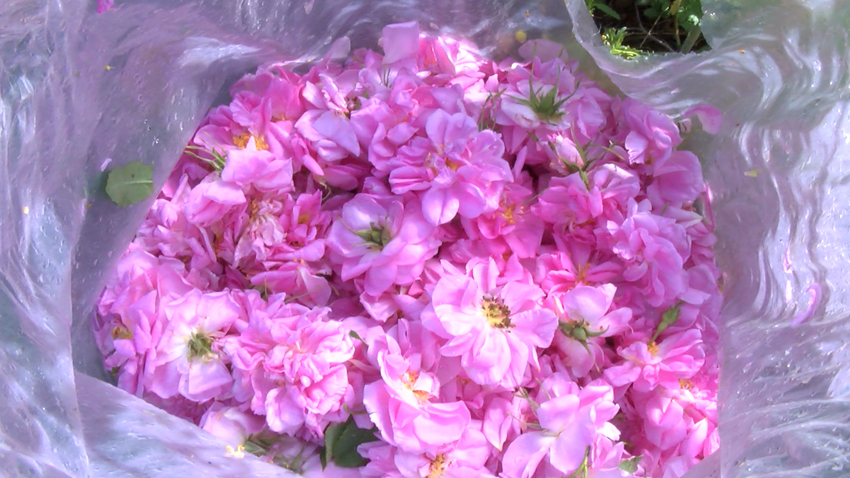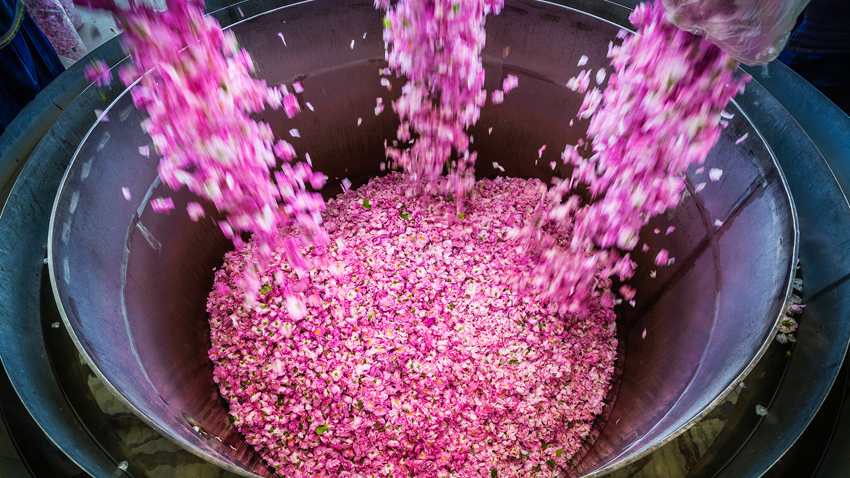Rose-picking in Bulgaria starts at the end of May along with the traditional festivals of the rose. In Bulgaria for the production of rose oil the Kazanlak oil-bearing rose, heir of Rosa damascene, is used. The first documented evidence of its cultivation in today's Bulgarian lands date back to the early 18th century. Even before the Liberation, rose cultivation spread to approximately 10,000 decares, the best conditions for the purpose being found in the famous Rose Valley today - the light sandy forest soils that do not retain water and the favorable mild winter climate with an average annual temperature of 10.6 ° C. At the beginning of the 19th century, its first steps were made towards international trade with Bulgarian rose oil - for Edirne, Paris, Dresden, Vienna, London ...
Today, the most common varieties of the Kazanlak oil-bearing rose are the "Iskra", "Svezhen", "Eleina" and "Yanina" created by the Institute of Roses, Essential and Medical Cultures in the town of Kazanlak. These varieties are distinguished by their oil yield, frost resistance and essential oil content. For example, the Eleina variety can withstand temperatures below – 30 degrees Celsius. Here is more from head of the institute prof. Ganka Baeva:
"Another variety is the white oil-bearing rose, which is mainly used in the production of the most expensive perfumes in the world. Its yield is much higher than that of other varieties,” Prof. Baeva explains.

Among the achievements of the Institute is a technology for rose propagating by planting green cuttings in cultivation facilities. From each rooted cutting a new plant develops, preserving the qualities of the mother plant. This is the main method for obtaining genetically homogeneous material for preserving the varieties of the oil-bearing rose. The advantages of this method are that it is highly effective and production period is shortened - 4 months are enough for the roses to become ready for planting.
More from prof. Baeva:
"Currently there are about 37-38 thousand decares of rose plantations in the country. The number of plantations has been rising. A major problem faced by the industry is the lack of rose-pickers."
In 2016, about 17,000 tons of rose petals were collected at an average yield of 450 kilograms per decare. But what is the market share of Bulgarian rose oil in the world?

"Bulgaria tops the chart in the production of high-quality rose oil," Prof. Ganka Baeva says. “Bulgarian rose oil contains over 200 000 ingredients, making it suitable for perfumery. In order to obtain a high quality rose oil, besides the varieties created by us, it is the unique climate in the Rose Valley that contributes a lot. Most of the Bulgarian oil is exported to France for the perfumery industry and to Germany where it is used predominantly in the pharmaceutical industry, for example in the production of anti-allergy medications. The Bulgarian rose oil has also been successful on the Japanese market. 95 percent of the Bulgarian rose oil is exported to foreign countries.”
The international price of the fragrant liquid is between 5-6 thousand euros per kilogram. For the production of 1 kg of rose oil a ton of rose petals is needed, and in adverse climatic conditions the needed amount of petals can reach 3-4 tons.
English: Alexander Markov
The budget for 2025 is feasible and will likely be the last one in Bulgarian leva, Minister of Finance Temenuzhka Petkova said in an interview with bTV. The draft law on the state budget for 2025 has been prepared without increasing existing..
A Bulgarian-Ecuadorian Business Forum will be held in Bulgaria, jointly organized by the Bulgarian Chamber of Commerce and Industry and the Pro Ecuador office in Italy, accredited for Bulgaria. The event will take place on March 13, 2025 at the..
The USA is among Bulgaria's leading foreign trade partners, the US market is among the main export destinations for Bulgarian high-tech products . This was announced by the Minister of Economy and Industry, Petar Dilov, at the opening of the Explore..
The budget for 2025 is feasible and will likely be the last one in Bulgarian leva, Minister of Finance Temenuzhka Petkova said in an interview with bTV...

+359 2 9336 661
